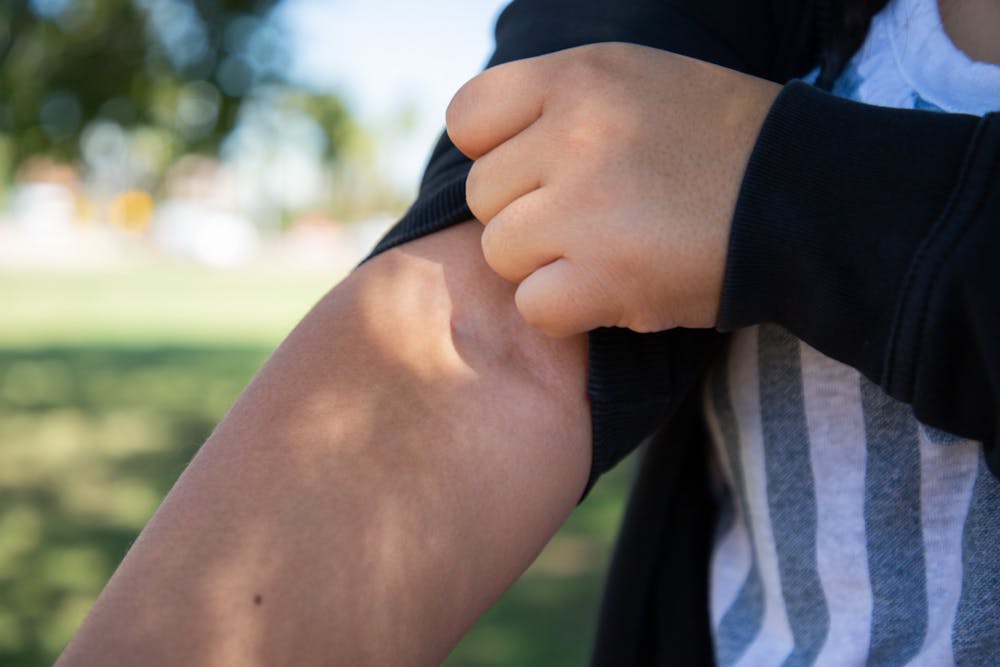The COVID-19 pandemic has brought extra attention to the upcoming flu season, and the Arizona Department of Health Services is working to get Arizona vaccinated.
ADHS's "Roll Up Your Sleeve" campaign encourages Arizonans to get the current influenza vaccine by providing information on symptoms of influenza and where to get vaccinated, as well as statistics and graphics related to the current flu season.
ADHS Director Dr. Cara Christ said vaccinations are especially important in helping those around you stay healthy.
"For college students, not only is it your chance to protect yourselves, it’s your chance to protect others," Christ said.
Christ said one of the reasons this campaign is so important is because increased demand for hospitals from influenza cases could put a strain on resources.
Getting vaccinated for influenza could be critical to maintaining the availability of intensive care unit beds. In early July, the number of ICU beds available in Arizona dropped below 10%, according to the ADHS data dashboard. Monday's report shows 20% of Arizona's ICU beds are available, with 9% of the beds in use from COVID-19 patients.
Karen Kibler, an assistant research professor at the Biodesign Center for Immunotherapy, Vaccines and Virotherapy, said misconceptions about vaccinations can drive people away from getting them. She said some people wrongly believe being infected naturally is better for building immunity than a vaccine.
"Scientifically that isn't true for at least the flu vaccine," Kibler said. "If a vaccination can give you the same protection without getting sick, why would you choose to be sick?"
Kibler said the virus found in influenza vaccines also isn't the same as what would infect a person naturally.
"The shot that most of us get, that's an inactivated virus, so the virus is killed," Kibler said. "Then the proteins that are most noticeable by the immune system are extracted, and that's what you get in your arm."
Matthew Scotch, an associate professor at ASU's College of Health Solutions and assistant director of the Biodesign Center for Environmental Health Engineering, said the benefits of a vaccine greatly outweigh the side effects.
"If you get the vaccine and you still get the flu, you're better off than if you get the flu without the vaccine because symptoms have been shown to be milder," Scotch said. "Your length of stay (in a hospital) is going to be less, so there are only benefits to getting the vaccine."
Kibler said the flu vaccine also can't give anyone the flu because there are only proteins in the vaccine, not a live virus. She said people might report getting the flu more often in years in which they receive vaccines for a few different reasons.
According to Kibler, it takes a couple of weeks for the body to create an immune response after being vaccinated. People may come in contact with an influenza virus before being vaccinated, but will not show signs of the sickness until after. Kibler also said people could contract a different virus that shares symptoms with the flu, like the common cold.
Additionally, some people don't feel well after being vaccinated because of their body's response to the vaccine.
"When you don't feel good after a flu shot, it's usually because your immune system is responding," Kibler said. "When it does that, it produces a substance called interferon, and interferon makes you feel kind of yucky."
ASU Health Services offers flu shots by appointment and through clinics on each campus. Appointments are not required for the flu clinics listed below.
The clinic at the Sun Devil Fitness Center on Tempe campus is open Saturday from 11 a.m. to 4 p.m. with no other vaccination times available.
On the Downtown Phoenix campus, the AE England building hosts a clinic Fridays from 9 to 11:30 a.m. through Nov. 20.
A clinic in the southwest corner of the University Center Building on West campus is open Wednesdays from 1:30 to 3:30 p.m. until Oct. 28
Polytechnic campus's clinic is held Tuesdays from 2 to 4 p.m. on the Mall until Nov. 10.
"Probably the greatest gift you can give to your community is to be vaccinated because you stop the spread of the virus," Kibler said.
Reach the reporter at jageenen@asu.edu and follow @joshgeenen on Twitter.
Like The State Press on Facebook and follow @statepress on Twitter.




